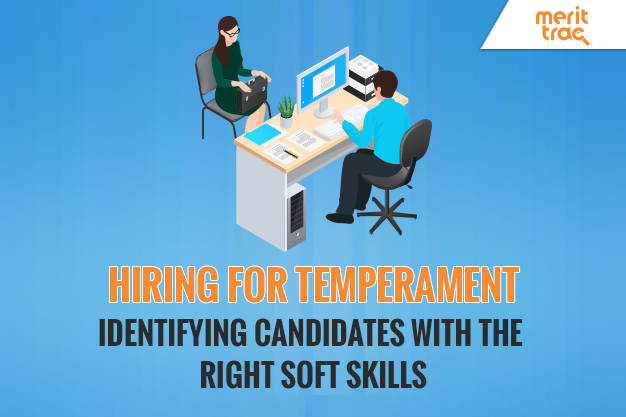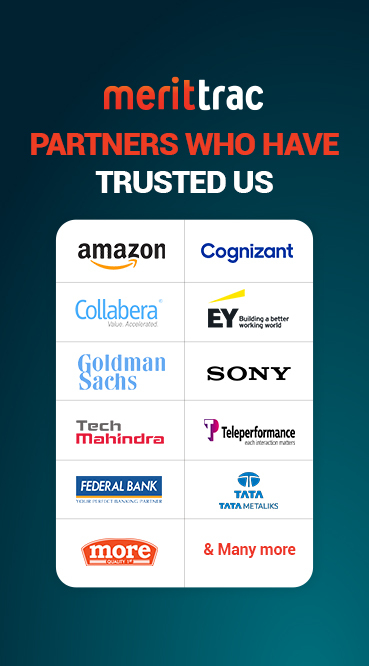
Hiring for Temperament: Identifying Candidates with the Right Soft Skills
Date: 16/05/2019 | Posted by: MeritTrac | Category: Corporate , Soft Skills
With robotics, artificial intelligence (AI) and machine learning rewriting the job descriptions, companies are looking for candidates with more complex and diverse skill sets that are crucial for tomorrow’s jobs. In addition to strong domain skills, soft skills such as communication and team spirit are considered critical for success in the emerging work paradigm.
According to the Global Talent Trends 2019 report, 92% of talent professionals reported that hiring for soft skills is equally important or more important than hiring for hard skills. But assessing candidates for soft skills such as communication, creativity or leadership quotient can be tricky in the absence of a structured approach. Technology-based scientific assessment solutions equip hiring managers with a fair and unbiased way to assess candidates for more abstract skills.
Online aptitude, behavioral and psychometric tests can help recruiters hire for these five soft skills that are most in demand across industries today:
- Strong communication skills
According to Monster Worldwide Inc., employees who know how to communicate with their peers are more productive. Ability to clearly articulate ideas and concepts with internal as well as external stake holders is a key competency for creating robust relationships and ensuring success in the emerging work paradigm. According to a survey of 1000 employers who recruit from business schools, oral communication was the top-rated skill for industries such as consulting, healthcare/pharmaceuticals, technology, products/services, and nonprofit/government. Listening skills, on the other hand, was rated as the top skill for the energy/utilities industry. Automated communication assessment platforms can help organizations evaluate candidate and employee communication skills, enhancing hiring outcomes and enabling the development of customized training programs.
- Ability to innovate
Futuristic companies proactively adopt new technologies and drive innovation to create competitive advantage. Google, for instance, allows its developers to devote 20% of their time to personal creative projects in order to promote creativity and nurture fresh ideas. At a time when organizations are grappling with intense competition, hiring innovative candidates can create distinct competitive advantage. But how can businesses identify candidates who can push the boundaries? Behavioral assessments offer immersive, compelling assessment experiences to accurately identify candidates with innovative and diverse thinking skills. Lloyds Banking group uses Virtual Reality (VR) to immerse candidates in real world situations they are likely to face as employees at the bank in order to understand their natural strengths and behaviors.
- Team spirit
The ability to work collaboratively in teams and effectively manage conflict is a critical skill in today’s globalized business landscape. Scientifically designed personality tests such as DISC, Myers-Briggs and Five-Factor Model of personality help employers identify candidates’ openness to experiences, extroversion, agreeableness, and so on. Using such assessments, employers can learn who is likely to cooperate in a team, who is assertive by nature, who is organized and so on. The tests can also be used to create self-awareness among employees to build strong, collaborative teams. 22% of companies use personality tests in the hiring process, including several global organizations such as Exxon Mobil, Ford, KPMG, Citigroup and Microsoft, to name a few.
- Customer-centricity
With increasing globalization and digitization, today’s customers are spoilt for choice and brand loyalty has a very small shelf-life. The new generation of customers is highly informed about what’s available in the market and extremely quick to compare brands. Clearly, customer oriented roles demand empathy, patience and resilience, skills that employers can scientifically and reliably evaluate using predictive assessments. Wells Fargo developed a predictive assessment model to identify the best candidates for customer facing positions such as tellers and personal bankers. As a result of right fit hiring, the bank’s retention rate for these positions rose by 15% and 12% respectively.
Objectively, online personality tests and assessments help employers narrow down the candidate pool and mitigate human biases that can creep in while assessing abstract skills. Hiring managers can then take the insights provided by the assessments to further tweak their personal interviews and gain a deeper understanding of candidates’ strengths and weaknesses, ensuring right fit candidate selection.
Sources:
- business.linkedin.com
- Monster.com
- Inc.com
- Mba.com
- Forbes.com
- News.Gallup.com
- Valentgroup.com
- Graduatemonkey.com
- Mckinsey.com
- Canon.com.au












 Sales Hotline: USA: +1 646 916 0939 / Others: +91 80619 14700
Sales Hotline: USA: +1 646 916 0939 / Others: +91 80619 14700


